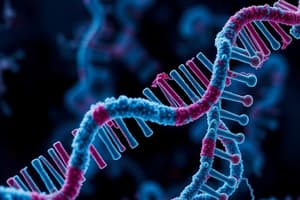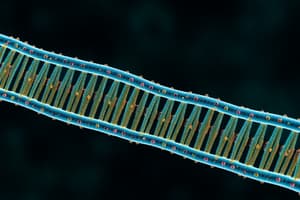Podcast
Questions and Answers
What is the primary function of spliceosomes in RNA splicing?
What is the primary function of spliceosomes in RNA splicing?
- To catalyze splicing reactions and join exons (correct)
- To remove exons and join introns
- To add a 7-methylguanosine cap to the 5' end of the mRNA
- To transport mature RNA from the nucleus to the cytoplasm
Which type of splicing generates different isoforms from the same gene?
Which type of splicing generates different isoforms from the same gene?
- mRNA stability
- RNA localization
- Constitutive splicing
- Alternative splicing (correct)
What is the primary mechanism of RNA transport through the nuclear pore complexes?
What is the primary mechanism of RNA transport through the nuclear pore complexes?
- Endocytosis
- Active transport using ATP
- Facilitated transport by RNA-binding proteins and transport factors (correct)
- Diffusion through the nuclear pore
Which of the following is a mechanism of RNA localization?
Which of the following is a mechanism of RNA localization?
What is the primary function of AU-rich elements in mRNA stability?
What is the primary function of AU-rich elements in mRNA stability?
What is the function of the 7-methylguanosine cap added to the 5' end of the mRNA?
What is the function of the 7-methylguanosine cap added to the 5' end of the mRNA?
What is the primary function of the poly(A) tail added to the 3' end of the mRNA?
What is the primary function of the poly(A) tail added to the 3' end of the mRNA?
Which of the following post-transcriptional modifications occurs co-transcriptionally?
Which of the following post-transcriptional modifications occurs co-transcriptionally?
What is the primary function of the 7-methylguanosine cap added to the 5' end of the mRNA?
What is the primary function of the 7-methylguanosine cap added to the 5' end of the mRNA?
What is the main function of the poly(A) tail added to the 3' end of the mRNA?
What is the main function of the poly(A) tail added to the 3' end of the mRNA?
When do 5' capping and 3' maturation occur?
When do 5' capping and 3' maturation occur?
What is the consequence of defective 5' capping and 3' maturation?
What is the consequence of defective 5' capping and 3' maturation?
What is the function of the poly(A) tail in translation?
What is the function of the poly(A) tail in translation?
What is the function of the 5' cap in mRNA transport?
What is the function of the 5' cap in mRNA transport?
Flashcards are hidden until you start studying
Study Notes
Post-Transcriptional Modification
RNA Splicing
- Definition: Process of removing introns (non-coding regions) and joining exons (coding regions) to form mature RNA
- Occurs in the nucleus
- Spliceosomes: Complexes of small nuclear RNAs (snRNAs) and proteins that catalyze splicing reactions
- Two types of splicing:
- Constitutive splicing: Default splicing pattern
- Alternative splicing: Generation of different isoforms from the same gene
RNA Transport
- Definition: Process of transporting mature RNA from the nucleus to the cytoplasm
- Transport through nuclear pore complexes (NPCs)
- RNA-binding proteins (RBPs) and transport factors facilitate transport
- Quality control mechanisms ensure only mature RNA is transported
RNA Localization
- Definition: Targeting of RNA to specific subcellular regions
- Mechanisms:
- RNA-binding proteins (RBPs) and localization elements in the RNA
- Microtubule and actin cytoskeleton involvement
- Localization to specific organelles or membrane-bound compartments
mRNA Stability
- Definition: Regulation of mRNA degradation rates
- Factors influencing stability:
- AU-rich elements (AREs) in the mRNA
- RNA-binding proteins (RBPs) and microRNAs
- Deadenylation and decapping enzymes
- Stability affects gene expression and cellular responses
5' Capping
- Definition: Addition of a 7-methylguanosine (m7G) cap to the 5' end of the mRNA
- Capping occurs co-transcriptionally
- Functions:
- Blocks 5' exonuclease degradation
- Enhances translation initiation
- Recruits RNA-binding proteins for transport and localization
3' Maturation
- Definition: Addition of a poly(A) tail to the 3' end of the mRNA
- Polyadenylation occurs co-transcriptionally
- Functions:
- Stabilizes mRNA by blocking 3' exonuclease degradation
- Enhances translation initiation
- Influences mRNA localization and transport
Post-Transcriptional Modification
RNA Splicing
- RNA splicing removes introns and joins exons to form mature RNA
- Occurs in the nucleus
- Spliceosomes catalyze splicing reactions
- Constitutive splicing is the default pattern
- Alternative splicing generates different isoforms from the same gene
RNA Transport
- RNA transport involves moving mature RNA from the nucleus to the cytoplasm
- Transport occurs through nuclear pore complexes
- RNA-binding proteins and transport factors facilitate transport
- Quality control ensures only mature RNA is transported
RNA Localization
- RNA localization targets RNA to specific subcellular regions
- RNA-binding proteins and localization elements in the RNA facilitate localization
- Microtubule and actin cytoskeleton involvement is necessary
- Localization occurs to specific organelles or membrane-bound compartments
mRNA Stability
- mRNA stability is regulated by degradation rates
- AU-rich elements, RNA-binding proteins, and microRNAs influence stability
- Deadenylation and decapping enzymes also affect stability
- Stability affects gene expression and cellular responses
5' Capping
- 5' capping adds a 7-methylguanosine cap to the mRNA
- Capping occurs during transcription
- The cap blocks 5' exonuclease degradation
- The cap enhances translation initiation
- The cap recruits RNA-binding proteins for transport and localization
3' Maturation
- 3' maturation adds a poly(A) tail to the mRNA
- Polyadenylation occurs during transcription
- The poly(A) tail stabilizes mRNA by blocking 3' exonuclease degradation
- The poly(A) tail enhances translation initiation
- The poly(A) tail influences mRNA localization and transport
Post-Transcriptional Modification
5' Capping
- Occurs shortly after transcription initiation
- Adds a 7-methylguanosine (m7G) molecule to the 5' end of the mRNA
- Protects mRNA from degradation by exonucleases
- Helps recruit ribosomes for translation
- Plays a role in mRNA transport out of the nucleus
3' Maturation
- Adds a poly(A) tail to the 3' end of the mRNA
- Poly(A) tail is a long chain of adenylate residues (typically 100-200 nucleotides)
- Stabilizes mRNA by preventing degradation by exonucleases
- Facilitates mRNA transport out of the nucleus
- Enhances translation by recruiting ribosomes
- Plays a role in regulating mRNA stability and localization
Key Points
- 5' capping and 3' maturation occur co-transcriptionally
- These modifications are crucial for mRNA stability, transport, and translation
- Defects in these modifications can lead to aberrant mRNA processing and diseases
Studying That Suits You
Use AI to generate personalized quizzes and flashcards to suit your learning preferences.




